Some years ago now we asked which were the most difficult subjects at GCSE.
To be honest, it wasn’t a question we could actually answer. What we did was look at whether some subjects appeared to be graded more severely (or more leniently) than others.
In particular, it seemed almost certainly the case that modern foreign languages (MFL) was being graded more severely than other subjects.
It’s been a while since we looked at this, so let’s see what has happened since using more recent data.
Data
We use amended Key Stage 4 data for 2022 for pupils on roll in state-funded mainstream and special schools.
This was the first year of examination data since the start of the pandemic, with grades overall slightly higher than in 2019.
The data contains results in all approved qualifications entered by pupils in GCSEs and equivalent qualifications. We restrict ourselves to just those qualifications that are in scope of Key Stage 4 Performance Tables.
For each pupil, we calculate their average grade in English language and maths. These are the two subjects we would expect the vast majority of pupils to enter.
For each subject, we compare the grade achieved by each pupil to their average score in English and maths. Non-GCSE qualifications are allocated scores equivalent to GCSE grades for the purposes of Performance Tables which we use in place of grades.
Grading severity of GCSEs
The chart below shows the severity of grades in GCSEs relative to English and maths for all subjects with at least 20 thousand entrants in 2022. Numbers of entrants (in thousands) are shown in brackets.
The rank order remains similar to the last time we looked at this in 2019. Grades in English language tend to be slightly higher than those in maths.
Pupils who enter art and design tend to achieve half a grade or more higher than in English and maths.
By contrast, pupils who enter French, German, Spanish and computer science tend to achieve half a grade lower than in English and maths.
Despite efforts to bring French and German in line with Spanish, they still seem more severely graded.
And Spanish is still more severely graded than other subjects anyway.
Grading severity of non-GCSEs
The next chart shows similar data for the most popular qualifications other than GCSEs. Each of the qualifications listed had at least 10 thousand entrants in 2022.
Pupils entering the BTEC first award in sport tend to achieve a grade higher than in GCSE English and maths. Results achieved in BTEC performing arts and BTEC health and social care also tend to be half a grade higher than GCSE English and maths, as does the WJEC hospitality qualification.
However, not all BTECs are scored more highly than English and maths. Pupils who enter BTEC digital information technology qualification achieve similar scores to English and maths on average.
The relationship between attainment and grading severity
There is a degree of correlation between attainment – as measured by average GCSE grade in English and maths – and grading severity, as indicated by the following chart.
English and maths attainment tends to be lower among the less severely graded subjects including BTEC sport and GCSE photography.
By contrast, English and maths attainment tends to be higher among pupils entered for French, German, Spanish and computer science.
That said, English and maths attainment is highest of all among entrants in the triple sciences, yet grades in those subjects are more in line with English and maths, albeit slightly lower on average.
Do pupils who enter MFL achieve lower Progress 8 scores?
You might think that pupils entering MFL are worse off under Progress 8.
But, as the chart below shows, pupils who enter French, German or Spanish [1] tend to achieve higher Attainment 8 scores than pupils with similar prior attainment.
This even remains the case when we limit the analysis to pupils entered for all four of the other EBacc pillars (English, maths, two sciences and humanities).
In fact, the average Progress 8 score of pupils entered for French, German or Spanish in 2022 was +0.49.
This level of performance has little to do with results in MFL and probably says more about which pupils are entered for the subject.
Even controlling for prior attainment, pupils who enter MFL tend to achieve a higher level of overall attainment at Key Stage 4, which tends to suggest a higher level of unobserved prior attainment or motivation.
Or put another way, if we entered more pupils for MFL there wouldn’t necessarily be an increase in overall attainment because the relationship is not causal.
In fact, this is very similar to differences in attainment between pupils entered for triple sciences compared to those entered for double science.
Similarly, if pupils who entered MFL entered another subject instead, it is possible that they would have achieved even higher Progress 8 scores. Our previous work suggests that around a quarter of entries in MFL do not even contribute to Progress 8 anyway as they are discounted by higher grades in other subjects.
Will anything ever be done about differences in grading?
That MFL appears to be graded more severely is not a new finding. Lord Dearing’s language review of 2006 found much the same.
However, QCA (then the regulator of qualifications) thought otherwise. “The public examination system is not based on an aptitude-based conception of comparability”.
This then raises questions about the comparability of grading. What does it mean to have a grade 4 in French? Is it the same standard as grade 4 in history? Or English language? How could we ever know for sure?
And that is also leaving to one side the important question of whether a grade 4 really is a grade 4 and not a grade 3 or a grade 5.
But if grades are not comparable from one subject to another, then there are two choices for using grades in accountability measures: do nothing, or use points scores that vary from subject to subject for the same grade as we show here.
Read more about how grading severity varies by pupil characteristics.
- We do not include other modern foreign languages
Want to stay up-to-date with the latest research from FFT Education Datalab? Sign up to Datalab’s mailing list to get notifications about new blogposts, or to receive the team’s half-termly newsletter.







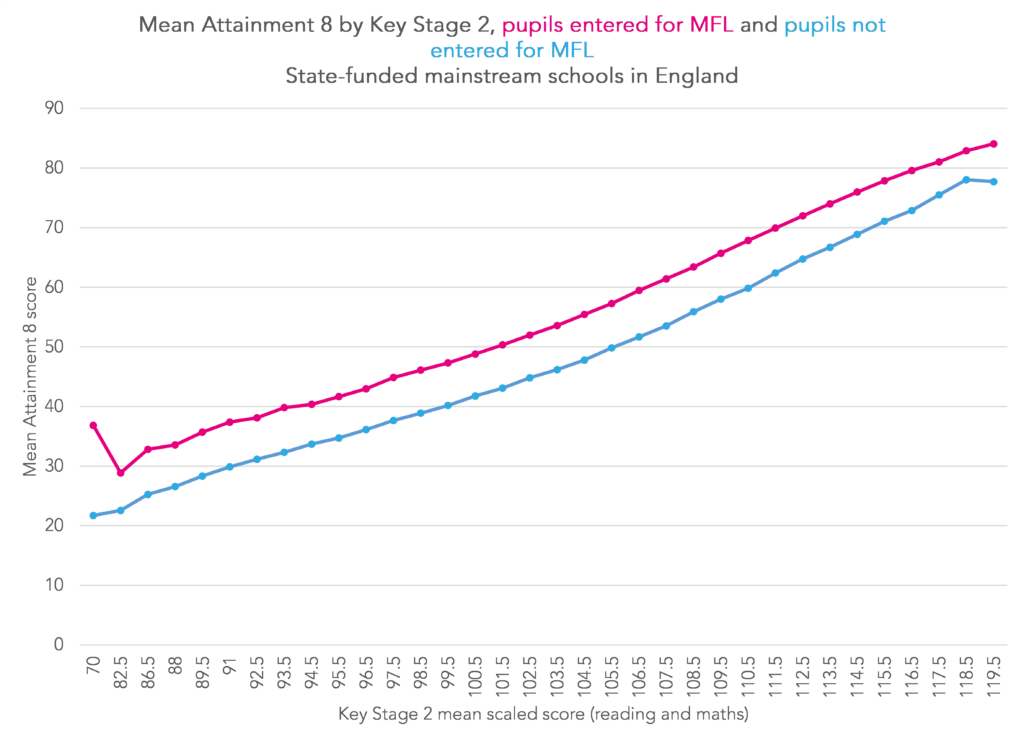
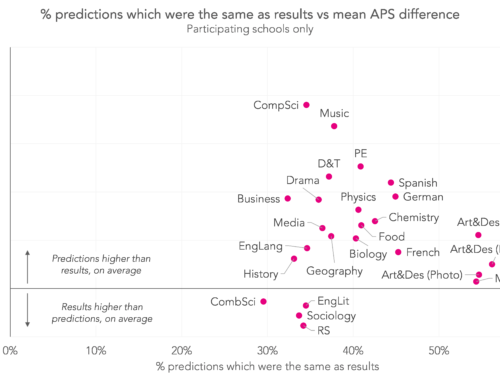

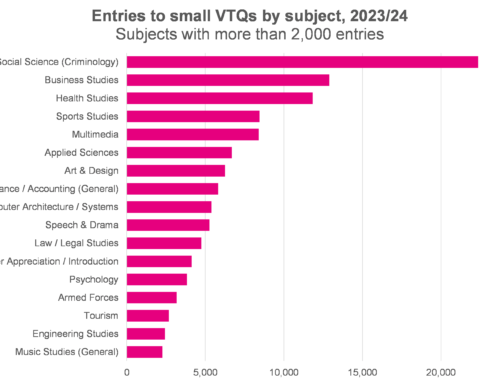
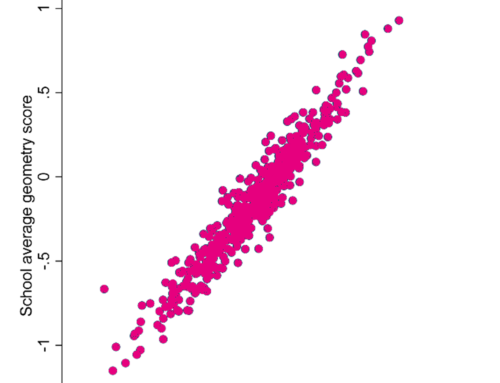
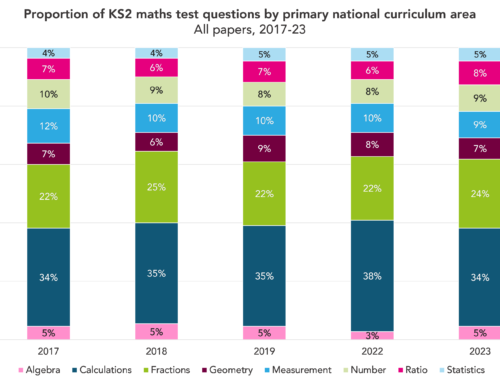
Is it possible to get hold of the underlying data to enable me to check the relative “difficulty” of GCSE Dance versus BTEC Tech Award in Performing Arts (Dance option)?
Hi Steven. Sorry I didn’t include either qualification in the analysis as they fell below the threshold I set for numbers of entrants.
Hello Dave
Always find the subject comparability issue fascinating. I know you have placed the link for the previous work on ‘weird science’, in 2022 that gap between Combined and Separate is ever wider (From a FOIR from DfE comparing Combined Vs Separates APS based on prior KS2 attainment groups).
Further the work above presumably is for a national cohort of assumed National Average APS at KS2 – i.e. the whole national cohort? If you changed the parameters to only LA, MA and HA would you get completely characteristics? Or would you get the same just slightly accentuated for HA and perhaps depressed for LA?
Thanks Aalok. That would make a nice follow-up post- thanks for the suggestion.
Thanks for this. This is exactly why the numbers of pupils studying MFL at GCSE is low, why A Level numbers are plummeting and why university language faculties are closing. How is this fair? All subjects should have equal worth. If a subject is more difficult then the grade boundaries should be adjusted to reflect this.
There’s a plausible different story I think?
The “easier” subjects are the more elective ones that people only do when they really want to (and so can be expected to be better at them) and the “harder” ones are those people might be pushed into for one reason or another.
Hi Jason. It’s a theory- and certainly the data presented might support it for the subjects in which pupils tend to score more highly than in English and maths. I’m not sure about the other end of the scale though. Is there not a certain amount of electivity in computer science? I guess this could be tested a bit more if there were data on how much choice pupils had in the subjects they entered.
Can you tease out why this is the case? Is it because there is a benchmark for difficulty which goes beyond the English system eg Common European Framework and also the need to calibrate against a notional A-Level standard?
Hi Catherine. I think that would take it outside my fairly narrow field of expertise. But I agree some sort of comparative analysis of the curriculum demand in different subjects would be very helpful.
The flaw with this is you are basing difficulty on English and Maths. Arts subjects are far from easy but they attract students who are neurodiverse, those who are dyslexic, dycalcular, ADHD etc because they are visual students who work better in practical subjects but struggle in English and Maths. They have strong intellectual understanding but can express their intellect verbally and visually rather that through English and Maths. You have students who get A* in English and Maths but fail at art or Photography. Students who take Art subjects are more likely do to poorly in English and Maths but excell in art. This effects your data here. Art is not easy it just targets a different type of student. Many students pick art subjects because they think it is an easy option but soon realise they are full on, very hard work and they drop out. These figures perpetuate that myth.
Excellent observations which back up the frustrations that many MFL specialists have had for years. I hope that exam boards and qualifications bodies take note and reflect and act upon this.
Mike T would have been delighted with this article. For years we discussed the difference in subject difficulty, particularly with regards to MFL.
Look forward to reading any further research and reflections on this!
If you ask the students they will say that art is one of the hardest courses to pass because it is extremely difficult to get a high grade without working 24/7. So I find it interesting that the data is showing the opposite. The marking criteria is so strict to achieve grades above a level 6. The subject is often dumbed down by other disciplines but they have no concept of the blood, sweat and tears over the hours and hours of coursework, the intellectual artist analysis and self evaluations required. Working into the evening running workshops and extra sessions at weekends and holiday time and losing curriculum time to other things( we lost 17 lessons in year 11 since September yet still have to claw back the hours somehow. Art teachers, like many teachers of course, are pressurised more and more to meet megs and tags it’s no wonder the passion is being murdered and teachers are leaving the profession as they are burnt out. Since covid many students are different which makes it even harder to meet the exam boards requirements. I absolutely love my job and am a practising artist too but it is becoming harder every year!